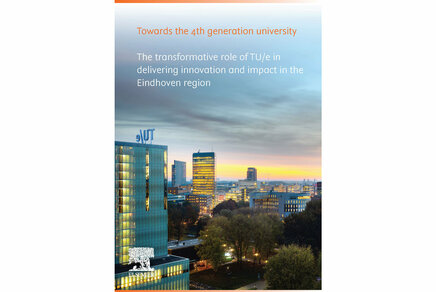Engaging the unengaged: Exploring citizen participation in nature-based solutions in China
Li Dai defended his PhD thesis at the department of Built Environment on October 12th.

Pressing unsolved environmental issues such as super-storms, floods, droughts, and heatwaves have become a critical challenge in many Chinese cities, such as Beijing and Guangzhou. The severe climate-related risks result in economic losses and threaten citizens’ safety, and decrease urban resilience, sustainability, and liveability. Nature-based solution have received extensive attention to address increasing socio-environmental challenges. For his PhD research, Li Dai explored the implementation of nature-based solutions and the role of citizens in these solutions.
Recurring urban disasters have raised considerable concerns and reflections over current urban development strategies, and a “low-impact development” strategy is highly supported by experts and researchers. Against this backdrop, nature-based solutions, a vital component of the urban low-impact development method, have received extensive attention to address increasing socio-environmental challenges.
Barriers
However, efforts to adopt, implement, and diffuse nature-based solutions can confront various barriers and fail to achieve the expected results. One of the dominant barriers is a lack of public awareness and engagement. Upscaling nature-based solutions projects requires integrated, coordinated, and multifaceted strategies involving a wide range of citizens to co-design and co-create at the neighbourhood level.
The externalities caused by these projects, such as visual landscape degradation, land acquisition, and inconvenience, often incite public opposition and protest, threatening project success and social stability. Although making citizens’ voices heard has become legally indispensable in China, citizen participation in the decision-making process of nature-based solutions is still “in its fancy.”
Citizen participation
For his PhD research, Li Dai examined citizen participation in nature-based solutions. He observed that the lack of citizen participation could be exclusively attributed to the local government’s predominant or even exclusive role in the decision-making process.
For citizen participation to happen, citizens’ response is largely overlooked. Therefore, Dai’s research aims to deepen the understanding of citizen participation in the nature-based solutions decision-making process within the Chinese context and contribute to future participatory design and planning suggestions.
The overall conclusion of Dai’s research is that citizens should be thoroughly involved in nature-based solutions to achieve community acceptance and project sustainability rather than saying yes or no in the feasibility study.
The research also highlights the following. First, there is an urgent need to underline the equal representation of the silent majority. Second, local government should be responsible for initiating and guiding the unengaged in participating in nature-based solutions due to their dominant position. Third, local government should improve the efficiency of information dissemination and consultation service to avoid citizens’ reliance on the informal network.
Notably, Chinese citizen participation in nature-based solutions continues to focus on informing citizens and lacks a standpoint for more profound levels of participation. The complicated social, political, cultural, and environmental situation in China requires a contextual and inclusive methodology to balance the informal and formal networks, and better facilitate participation in nature-based solutions.
Title of PhD thesis: Engaging the unengaged: Exploring citizen participation in nature-based solutions in China. Supervisors: Bauke de Vries and Qi Han.
Media contact
Latest news

![[Translate to English:] [Translate to English:]](https://assets.w3.tue.nl/w/fileadmin/_processed_/e/6/csm_Hendriks%20Banner%20image%20Photonic%20crystal%20fiber-tip%20sensor%20BvOF_9b4093b84b.jpg)
